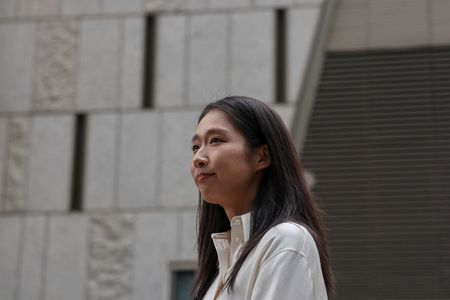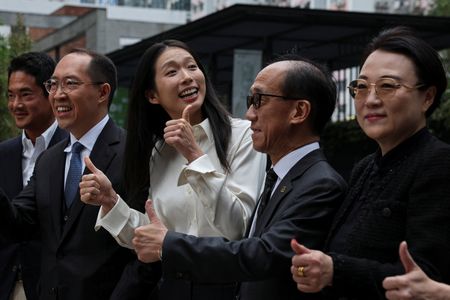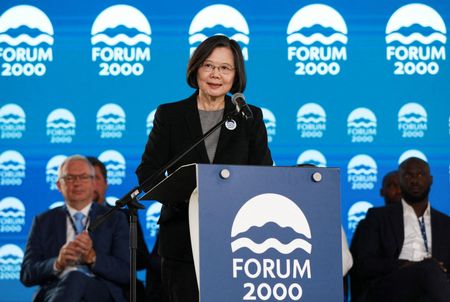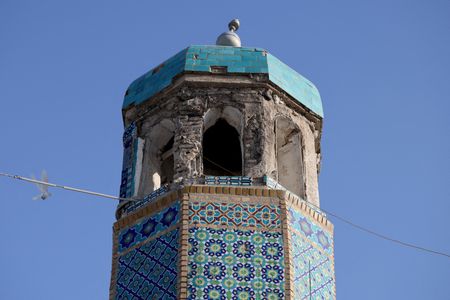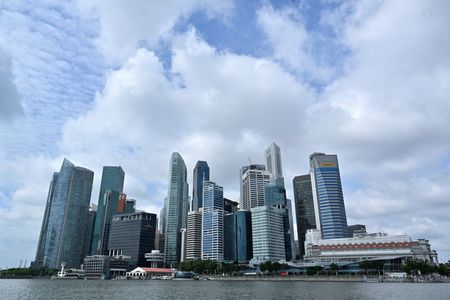By James Pomfret
HONG KONG (Reuters) -An Olympic gold medallist and other younger faces are entering upcoming elections in Hong Kong as China strives to shore up the legitimacy of the city’s legislature even though it vets all prospective candidates.
Beijing loyalists control the Legislative Council (Legco) but state media outlets have indicated that China wants more political talent and competition amongst its allies, with around one-third of the current legislature set to step down including veteran lawmakers from major pro-Beijing parties.
Vivian Kong, 31, a fencer who won gold at the 2024 Paris Olympics, and Howard Chao, 38, the son of real estate tycoon Cecil Chao and a member of China’s top political advisory body, are among two openly pro-Beijing residents of Hong Kong who have submitted nominations for the December 7 poll.
Nominations close on Nov. 6 after which they will be vetted by the Candidate Eligibility Review Committee, a group of senior Hong Kong officials working with national security police to conduct background checks on candidates for “patriotism”. It has discretionary power to disqualify anyone.
“An important purpose of the central government’s improvement of Hong Kong’s electoral system is to reverse the past trend of political infighting and build a high-quality democratic system,” China’s state-owned Ta Kung Pao newspaper wrote in an editorial this week. It added such a system would support the government to enhance economic development.
China’s Liaison Office in Hong Kong did not immediately respond to a request for comment.
After mass pro-democracy protests in 2019, China imposed a national security law in 2020 and revamped the electoral system in 2021, effectively marginalising the once feisty opposition.
The electoral overhaul included reducing the percentage of directly elected seats from half to less than a quarter and the installation of the committee to vet potential candidates.
Tik Chi-yuen, who claims to be the only mildly democratic voice left in the legislature, has said he won’t run again.
The entry by Kong, who is openly pro-Beijing, into the race is an example of non-party elites entering politics at a time when Chinese and Hong Kong authorities have sought to frame the city as democratic and open amid international criticism of the national security crackdown.
“Let me try to serve Hong Kong more … and win glory for Hong Kong,” said Kong earlier this week. The epee fencer staged a dramatic comeback in the 2024 Olympics final against a French rival to become the city’s third gold medallist.
She won’t contest one of the 20 directly elected seats in the 90-member legislature, but one of 30 seats reserved for those who represent professional sectors.
A 1,500-strong committee stacked with Beijing loyalists will directly select 40 legislators.
For the tourism sector that Kong is contesting despite having no prior experience in that field, there are only around 176 votes and 2 candidates so far. This compares with directly elected seats where competition is fiercer with hundreds of thousands of eligible voters.
SECOND POLL AFTER ELECTORAL OVERHAUL
This will be the second legislative poll after the overhaul of the electoral system. Beijing, which took control of Hong Kong after the 1997 handover by Britain, had initially promised to allow universal suffrage as an ultimate goal, and to grant the city a high degree of autonomy over its affairs.
Opposition democrats, led by the Democratic Party, performed strongly in elections between 1997 and 2016, controlling over a third of the legislature at its peak, helping shape Hong Kong’s post handover democratic development and civil society.
Earlier this year, however, the Democratic Party announced it would disband after threats from China.
The Public Opinion Research Institute (PORI) found in a recent survey that over half of people were dissatisfied with the performance of incumbent lawmakers, and 60% of respondents didn’t know who was running in their constituency.
The only time the legislature vetoed a bill in the past four years was a bill that would have allowed limited legal rights for same-sex couples.
Some analysts say Kong’s star allure and fighting spirit will help spotlight an institution criticized as a pro-Beijing echo chamber with little authentic debate, that drew a record low turnout of 30.2% in 2021.
Senior Hong Kong officials have sought to drum up voter participation after the poor previous showing, while major chambers of commerce, several Chinese state-owned enterprises and some Hong Kong companies have urged people to vote.
Telecom operator PCCW said it would provide half a day of paid leave for staffers to cast ballots, local media reported.
“Beijing wants to rejuvenate the profile of candidates through Vivian Kong’s participation, such that more young people will be aware of the election,” said Sonny Lo, a political scientist who has authored several books on Hong Kong politics.
But others remain unconvinced.
“People like Vivian will be very politically dependent on those who nominate and support her to their positions,” said Derek, 28, a resident who declined to give his surname given the sensitivity of the issue.
“This would further undermine the possibilities of autonomous decisions in the Legco.”
(Additional reporting by Joyce Zhou and Jessie Pang; Editing by Kevin Krolicki and Raju Gopalakrishnan)

